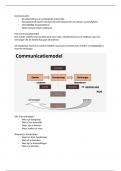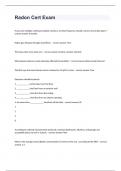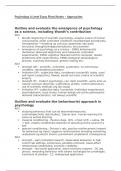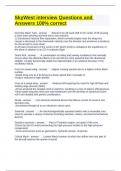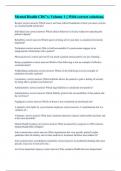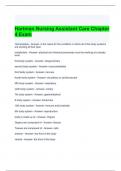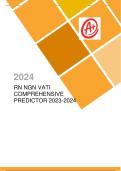ECS2604/1/2022
Labour Economics Assignment 2, First
Semester 2022: Answers
Compiled by Ranga 0618441387,
ASSIGNMENT 02/2022 (First Semester 2022)
Submission Date 8 April 2022
Marks 50
Learning Units 6-9
Unique Number 626834
Question 1
Use the efficiency wage hypothesis to discuss the statement: “under certain
circumstances a wage increase could lead to increase in productivity”. (10)
Efficiency wage hypothesis posits that under certain circumstances a wage increase could lead to
increase in productivity. What is important is not whether productivity increases, but whether it
increases by more than the wage increase, i.e. whether the productivity improvement fully
compensates for the labour cost increase. If this does indeed happen, it might be more efficient for
the employer to pay higher wages, as this might reduce the unit labour cost.
There are various reasons why this might be the outcome. An employer must pay its workers high
enough so that workers are incentivized to be productive and that highly skilled workers do not
quit. Higher wages might enable (or induce) the employer to recruit employees more carefully.
This increases the chances of recruiting fit-for-purpose employees and hence productivity
increases. A higher wage might make employers more willing to invest in their workers. This
makes the employees even more productive as the employer is willing to train and retrain its
employees.
, Workers’ morale might improve due to their higher wages, and their absenteeism might be lower
because their opportunity cost of not working is higher. This also improves effort that the worker
exerts and productivity increases. Furthermore, workers’ nutritional and health levels might
improve, positively affecting their physical vigour and mental alertness of workers.
Workers might, at least in the short term, be motivated by the higher wages to improve their
productive effort. They might even do so over the long term if they fear being dismissed from a
well-paying job. Labour productivity might also increase as a result of wage increases if the
employer attempts to reduce the wage bill by becoming more capital intensive.
Question 2
Assume a very small economy compromised of the following people:
• The economy consists of the population that has an age group of 16 years and
older.
• Sizile and Kedibone work as receptionists in the municipality of Limpopo
• Mapula has left her job to become a full-time housewife.
• Khensani has not had work for quite a while, and occasionally flips through job
ads to see what kinds of jobs are available.
• Jabu does not have work but is actively sending out his resume to employers
while Sizwe prefers to make money from gambling.
• Moses has just graduated from college and is starting his job search.
• Qhawe lost his job during lockdown regulations and has been experiencing
depression.
2.1 What is the strict labour force participation rate in this economy?
(Show calculations) (5)
𝐿𝑎𝑏𝑜𝑢𝑟 𝐹𝑜𝑟𝑐𝑒
𝐿𝑎𝑏𝑜𝑢𝑟 𝑓𝑜𝑟𝑐𝑒 𝑝𝑎𝑟𝑡𝑖𝑐𝑖𝑝𝑎𝑡𝑖𝑜𝑛 𝑟𝑎𝑡𝑒 = ∗ 100
𝑊𝑜𝑟𝑘𝑖𝑛𝑔 𝑎𝑔𝑒 𝑝𝑜𝑝𝑢𝑙𝑎𝑡𝑖𝑜𝑛
Strict labour force participation rate excludes those unemployed persons who
are not actively looking for a job, thus, Khensani is excluded in this case
7
𝐿𝑎𝑏𝑜𝑢𝑟 𝑓𝑜𝑟𝑐𝑒 𝑝𝑎𝑟𝑡𝑖𝑐𝑖𝑝𝑎𝑡𝑖𝑜𝑛 𝑟𝑎𝑡𝑒 = 8 ∗ 100 = (5)
(2.2 What is the expanded rate of unemployment? (Show calculations) (5)
𝑁𝑢𝑚𝑏𝑒𝑟 𝑜𝑓 𝑢𝑛𝑒𝑚𝑝𝑙𝑜𝑦𝑒𝑑 𝑝𝑒𝑟𝑠𝑜𝑛
𝑈𝑛𝑒𝑚𝑝𝑙𝑜𝑦𝑚𝑒𝑛𝑡 𝑟𝑎𝑡𝑒 = ∗ 100 = 87.5%
𝐿𝑎𝑏𝑜𝑢𝑟 𝑓𝑜𝑟𝑐𝑒
5
𝑈𝑛𝑒𝑚𝑝𝑙𝑜𝑦𝑚𝑒𝑛𝑡 𝑟𝑎𝑡𝑒 = ∗ 100 = 62.5%
8
Labour Economics Assignment 2, First
Semester 2022: Answers
Compiled by Ranga 0618441387,
ASSIGNMENT 02/2022 (First Semester 2022)
Submission Date 8 April 2022
Marks 50
Learning Units 6-9
Unique Number 626834
Question 1
Use the efficiency wage hypothesis to discuss the statement: “under certain
circumstances a wage increase could lead to increase in productivity”. (10)
Efficiency wage hypothesis posits that under certain circumstances a wage increase could lead to
increase in productivity. What is important is not whether productivity increases, but whether it
increases by more than the wage increase, i.e. whether the productivity improvement fully
compensates for the labour cost increase. If this does indeed happen, it might be more efficient for
the employer to pay higher wages, as this might reduce the unit labour cost.
There are various reasons why this might be the outcome. An employer must pay its workers high
enough so that workers are incentivized to be productive and that highly skilled workers do not
quit. Higher wages might enable (or induce) the employer to recruit employees more carefully.
This increases the chances of recruiting fit-for-purpose employees and hence productivity
increases. A higher wage might make employers more willing to invest in their workers. This
makes the employees even more productive as the employer is willing to train and retrain its
employees.
, Workers’ morale might improve due to their higher wages, and their absenteeism might be lower
because their opportunity cost of not working is higher. This also improves effort that the worker
exerts and productivity increases. Furthermore, workers’ nutritional and health levels might
improve, positively affecting their physical vigour and mental alertness of workers.
Workers might, at least in the short term, be motivated by the higher wages to improve their
productive effort. They might even do so over the long term if they fear being dismissed from a
well-paying job. Labour productivity might also increase as a result of wage increases if the
employer attempts to reduce the wage bill by becoming more capital intensive.
Question 2
Assume a very small economy compromised of the following people:
• The economy consists of the population that has an age group of 16 years and
older.
• Sizile and Kedibone work as receptionists in the municipality of Limpopo
• Mapula has left her job to become a full-time housewife.
• Khensani has not had work for quite a while, and occasionally flips through job
ads to see what kinds of jobs are available.
• Jabu does not have work but is actively sending out his resume to employers
while Sizwe prefers to make money from gambling.
• Moses has just graduated from college and is starting his job search.
• Qhawe lost his job during lockdown regulations and has been experiencing
depression.
2.1 What is the strict labour force participation rate in this economy?
(Show calculations) (5)
𝐿𝑎𝑏𝑜𝑢𝑟 𝐹𝑜𝑟𝑐𝑒
𝐿𝑎𝑏𝑜𝑢𝑟 𝑓𝑜𝑟𝑐𝑒 𝑝𝑎𝑟𝑡𝑖𝑐𝑖𝑝𝑎𝑡𝑖𝑜𝑛 𝑟𝑎𝑡𝑒 = ∗ 100
𝑊𝑜𝑟𝑘𝑖𝑛𝑔 𝑎𝑔𝑒 𝑝𝑜𝑝𝑢𝑙𝑎𝑡𝑖𝑜𝑛
Strict labour force participation rate excludes those unemployed persons who
are not actively looking for a job, thus, Khensani is excluded in this case
7
𝐿𝑎𝑏𝑜𝑢𝑟 𝑓𝑜𝑟𝑐𝑒 𝑝𝑎𝑟𝑡𝑖𝑐𝑖𝑝𝑎𝑡𝑖𝑜𝑛 𝑟𝑎𝑡𝑒 = 8 ∗ 100 = (5)
(2.2 What is the expanded rate of unemployment? (Show calculations) (5)
𝑁𝑢𝑚𝑏𝑒𝑟 𝑜𝑓 𝑢𝑛𝑒𝑚𝑝𝑙𝑜𝑦𝑒𝑑 𝑝𝑒𝑟𝑠𝑜𝑛
𝑈𝑛𝑒𝑚𝑝𝑙𝑜𝑦𝑚𝑒𝑛𝑡 𝑟𝑎𝑡𝑒 = ∗ 100 = 87.5%
𝐿𝑎𝑏𝑜𝑢𝑟 𝑓𝑜𝑟𝑐𝑒
5
𝑈𝑛𝑒𝑚𝑝𝑙𝑜𝑦𝑚𝑒𝑛𝑡 𝑟𝑎𝑡𝑒 = ∗ 100 = 62.5%
8


